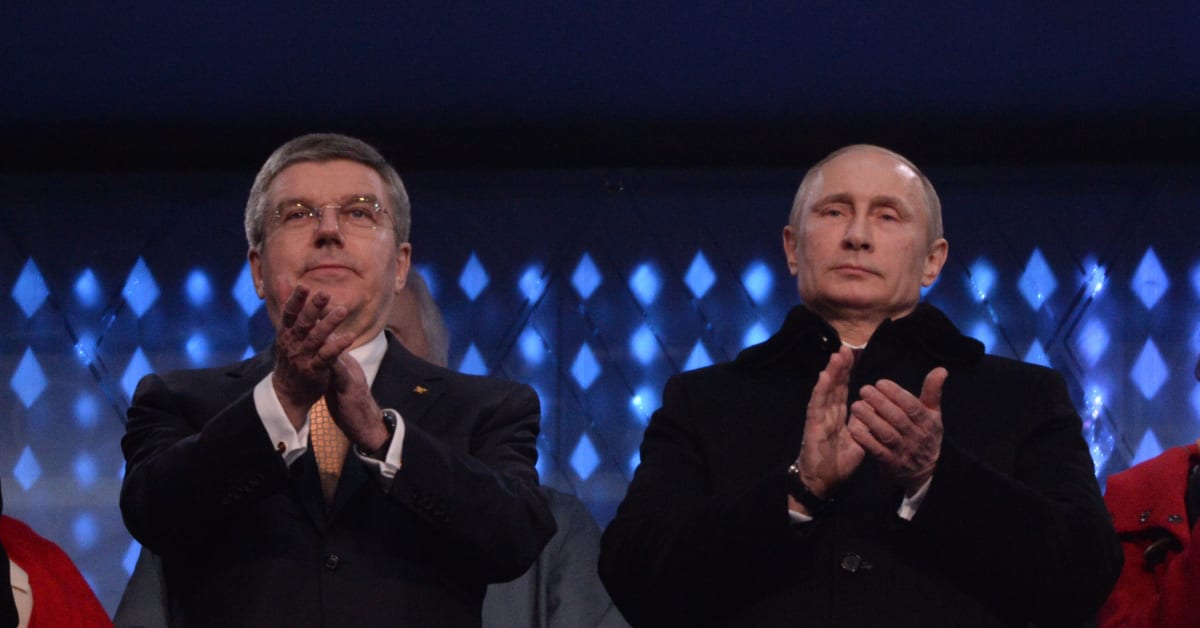
Banning Russia Is the Right and Only Move for FIFA, IOC, but Let’s Not Praise Them Just Yet
The International Olympic Committee and FIFA both moved Monday toward banning Russia from international sporting events, and what seems like a bold move is actually just an acknowledgment of the status quo. Most of the world’s most prosperous nations are imposing sanctions on Russia for its invasion of Ukraine, essentially trying to keep it from participating in the global economy.
The IOC and FIFA are following their leads, and it is the only sensible choice. But it should also put an end to the IOC’s nonsense reasoning that the Olympic Games are not political. That is simply not a tenable position in 2022.
The IOC had to do this. You know the IOC had no choice because, if it didn’t, it would have chosen something else. Athletes and federations were pushing the IOC to ban Russia—and Belarus, which has supported the Russian invasion. The heat was only going to go up. It forced the IOC to abandon its preferred mode of dealing with rogue states, which is inaction.

IOC president Bach continued to allow Russian athletes to compete in the Olympics despite Russia's participation in a systemic doping operation during the 2014 Winter Games. President Putin denied any wrongdoing.
Robert Deutsch/USA Today Sports
President Alexander Lukashenko of Belarus might be surprised by the decision since the IOC has kowtowed to him in the past. In December 2020, the IOC announced “provisional measures” against the Belarus National Organizing Committee. The first measure: “Ensure better protection of the athletes’ rights and preserve the athletes from any discrimination or undue pressure.” Then, during last summer’s Tokyo Olympics, Belarusian officials tried to force sprinter Krystsina Tsimanouskaya out of the country and took her to an airport after she complained about her coaches. She managed to defect to Poland, but the IOC let Belarus participate in the recent Winter Olympics in Beijing.
Where was the punishment for Belarus? Where were the assurances it wouldn’t happen again?
The IOC’s influence on world affairs is limited, no matter what president Thomas Bach says about the “Olympic movement.” If Russia and Belarus are indeed banned—that isn’t finalized yet—the effect beyond playing surfaces will probably just be symbolic. President Vladimir Putin of Russia is obviously not going to pull tanks out of Ukraine so his soccer team can qualify for the World Cup. And he obviously is not going to be swayed by public-opinion polls like the leader of a Democratic country would. He will surely use state media to spin the bans as jealous actions by anti-Russian entities controlled by the United States, anyway.
The sports ban is just a lever, and a small one at that. Frustrated oligarchs and declining Russian bond prices are far more likely to convince Putin to retreat.
But as much as any world leader in years, Putin has treated the Olympics as a vehicle to spread propaganda—using the 2014 Winter Olympics in Sochi as a platform to showcase mighty Russia to the world, decrying criticism of the state-sponsored doping program as anti-Russian rhetoric, even apparently pretending to be asleep during the opening ceremony in Beijing last month as the Ukrainian delegation was introduced. If the IOC and FIFA allow Russia to keep competing, they would effectively be sending Putin an invitation to use them to spread propaganda in an unjust and unprovoked war.
Their message to Putin now: We were fine being used to spread propaganda, but not for this.
It is the right and only move. It is also one the IOC has historically been scared to make (and might yet delay making this time, with the Paralympics about to start and Russian and Belarusian athletes ready to compete). A brief walk through history: In 1980, Juan Antonio Samaranch became IOC president after three years as Spain’s first ambassador to the Soviet Union. That same year, the U.S. led a massive boycott of the Summer Olympics in Moscow. Four years later, the Soviets led a boycott of the Summer Olympics in Los Angeles. Samaranch and the IOC understandably saw boycotts as an existential threat. Boycotts were bad for business.
Since 1984, the IOC has done everything it could to get as many countries as it could to participate in the Olympics. In the ’80s, Samaranch boosted Olympic subsidies, then announced any country that boycotted the Olympics would be ineligible for that funding for four years. There have been boycotts since then—North Korea refused to send athletes to Tokyo last summer and was subsequently banned from the recent Winter Olympics—but they have been rare.
The IOC can only do so much to protect the world, but it can do a lot more to protect Olympians. It should have dealt more harshly with Belarus last summer. It should have acted more forcefully with Russia in the past few years. Bach should never have happily participated in China’s coverup of the Peng Shuai scandal last month.
The IOC got pushed into doing the right thing Monday. Athletes and federations should keep pushing.




